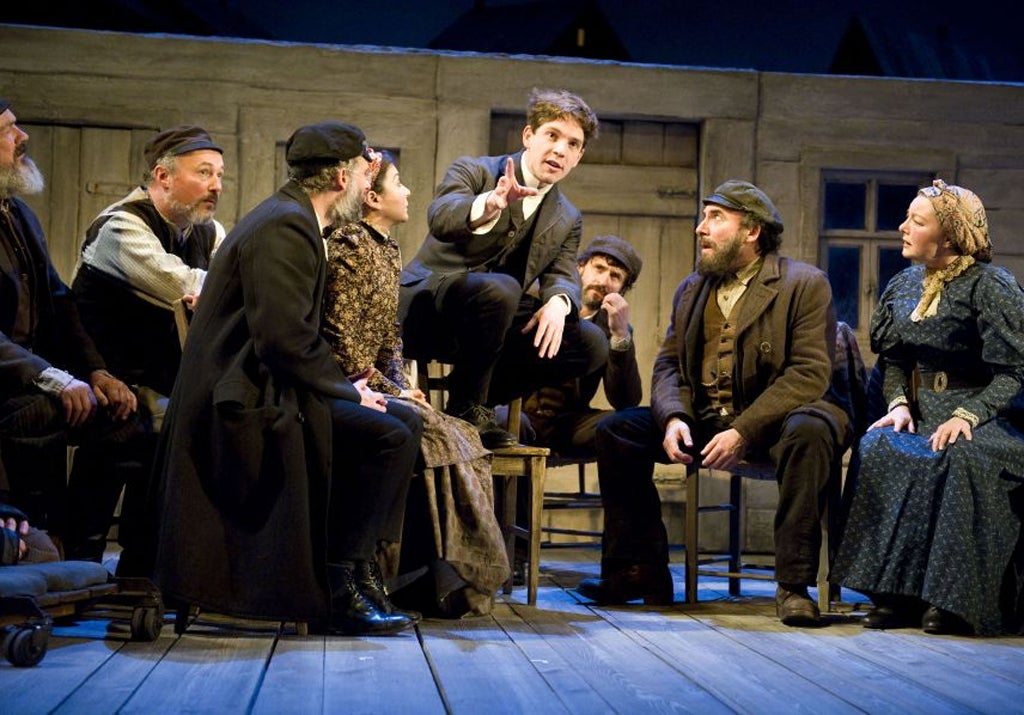Travelling Light, NT Lyttelton, London Constellations, Royal Court Upstairs, London Our New Girl, Bush, London
It's topical and has Nicholas Hytner at the helm– but a new play about the early days of cinema isn't silent, it's just dumb

The silent movie has certainly made a comeback, what with The Artist nominated for 12 Baftas, alongside its Golden Globe wins. And the National Theatre is impressively on the ball – or so one might suppose – as it gets 2012 rolling with Travelling Light.
Staged by Nicholas Hytner and written by Nicholas Wright, this new play – with dialogue – centres on a young man named Motl (Damien Molony), a pre-talkies filmmaker. We see his fledgling motion pictures flickering above the stage, in mock-vintage monochrome.
Basically, we're following this fictional pioneer's progress with an early cinematograph which has somehow turned up in his predominantly Jewish shtetl in the Pale of Settlement, circa 1900. As designed by Bob Crowley, this is a sanitised cluster of wooden huts, cutely twinkling in the dark.
Antony Sher's bearded Jacob is an illiterate timber merchant. With a wide-eyed enthusiasm for the silver screen, he's evidently meant to be sweet, funny and pushy – all characteristics writ large in Sher's performance. Jacob soon becomes Motl's financial backer, encouraging him to film the locals, organising screenings. Then Motl emigrates to become a Hollywood mogul (his older self played by Paul Jesson) who vaguely regrets abandoning his roots.
Travelling Light won't be garnering any awards, though. Watching the scenes where the rudiments of filmmaking dawn on Motl – assisted by his love interest and soon-to-be-leading actress Anna (Lauren O'Neil) – one may wonder if the NT has dumbed down beyond belief.
Gosh, Motl, I've had a brainwave! What is it, Anna? Get me some scissors, I've invented editing! But yikes, Motl, isn't it ironic that Jacob has started behaving like a stereotypical Hollywood producer – interfering on set, getting vox pops on the director's cut, wanting to sleep with the star ...? I confess, that's wanton paraphrasing, but Wright's dialogue is toe-curling and bizarrely jerky, underdeveloping relationships. Moreover, while Molony has no east European accent – just bland Received Pronunciation – Sher's Jacob sounds like Topol crossed with Tarzan ("I see bic light, bic sun, bic sky"). Schlock.
Constellations, by Nick Payne, plays far more arresting games with time. In this experimental two-hander – a darkening romantic comedy – Sally Hawkins's Marianne is a theoretical physicist who, on an early date, tries to explain the notion of a quantum multiverse – where all the choices you've ever (or never) made exist simultaneously in a vast ensemble of parallel universes.
What the playwright does is apply that to Marianne's on-off love affair with Rafe Spall's Roland, a mildly blokey bee-keeper. Radically disordering the linear narrative, their nervously jokey getting-together and their harrowed partings are played and replayed with numerous variations.
Maybe there could be fewer repeats, and we've had bees and string theory before in Charlotte Jones's Humble Boy (2001). However, Michael Longhurst's in-the-round production – on a bare, black stage under an eerie galaxy of white balloons – is taut and intensely touching. Hawkins and Spall spin on a sixpence between charming social comedy and heartbreaking tragedy, faced with which Marianne tries to comfort Roland, suggesting that, at the level of atoms, death really has no dominion: "We have all the time we've always had" – together in perpetuity.
In Our New Girl – another outstanding premiere – Kate Fleetwood's Hazel is heavily pregnant with her second child. She has quit her high-powered legal job to become a devoted mother and run a little deli business from home. This isn't going to plan, however, especially when a young nanny, Denise Gough's Annie, weirdly turns up on her doorstep and infuriatingly won't go away – insisting she's been hired by Hazel's husband, Richard.
Nancy Harris's drama, set in a gleaming designer kitchen, has sitcom moments but with a brewing sense of menace. Is Annie's morose child, Daniel, a delinquent in the making? Is she a hateful mother? Or is Mark Bazeley's Richard – a roving doctor more devoted to his charity work than his wife – conspiring with Annie to drive Hazel mad? One or two speeches sound stiff, but Charlotte Gwinner's cast are acutely unsettling, adding layers of subtle ambiguity, sexual tensions and nasty twists.
'Travelling Light' (020-7452 3000) to 6 Mar; 'Constellations' (020-7565 5000) to 11 Feb; 'Our New Girl' (020-8743 5050) to 11 Feb
Next Week
Kate Bassett attends the Trial of Ubu
Theatre Choice
As the seasonal shows start to wrap up, there's still plenty of time to catch the RSC's exuberantly funny Matilda – a family musical adapted from Roald Dahl, with songs by Tim Minchin. It's at London's Cambridge Theatre until 21 Oct. But make haste to see Mike Leigh's Grief, with Sam Kelly at the National Theatre, a quietly satirical then heartbreaking portrait of single parenting and teenage surliness, starring a superb Lesley Manville in 1950s suburbia (ends Sat).
Join our commenting forum
Join thought-provoking conversations, follow other Independent readers and see their replies
Comments